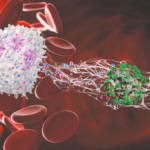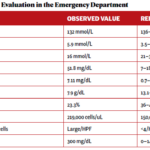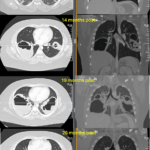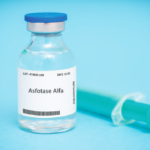In this episode of his monthly video series for The Rheumatologist, physician editor Dr. Bharat Kumar talks about the tenacity of hope.


In this episode of his monthly video series for The Rheumatologist, physician editor Dr. Bharat Kumar talks about the tenacity of hope.

Katie Robinson |
An understanding of the mechanisms underlying NET-mediated inflammation will empower clinicians to target therapies that can mitigate disease activity & improve outcomes in patients with lupus.

It’s dark. It’s cold. And it’s 5 p.m. here in Iowa. If that sounds rather bleak to you, I wouldn’t blame you. But to Stella, my 12-year-old canine companion, it’s a wonderland. She’s half-Shetland sheepdog and half-American Eskimo, so the colder and snowier it is, the more she feels at home. And although I do…

Carol A. Langford, MD, MHS |
Welcome to the first edition of the President’s Corner! I am grateful to Bharat Kumar, MD, MME, FACP, FAAAAI, RhMSUS, and the editors of The Rheumatologist for their support and encouragement in allowing me to have this opportunity each month to come together with rheumatologists and rheumatology health professionals. So why the President’s Corner? In…

Leslie Mertz, PhD |
“At my very first annual meeting of the ACR, I saw how the ACR brought the whole rheumatology community together, and I knew right away that it was an organization that I wanted to be a part of,” Dr. Langford says. In late November, she became the 88th president of the ACR and looks forward to continuing its focus on education, research and building community.

Leslie Mertz, PhD |
The diversity of the ARP’s membership is what originally drew Adam Goode, PT, DPT, PhD, to the organization, enticed him to begin volunteering more than a decade ago and now galvanizes him as he becomes the new ARP president.

Yvonne M. van der Kraan, BSc, Andrew Lui, PT, DPT, Anneke Spoorenberg, MD, Suzanne Arends, PhD, & Lianne S. Gensler, MD |
‘Physical therapy is a mainstay of managing rheumatic diseases, but what’s the evidence, how do we monitor, and what types of therapy should we advocate?’ asks Physician Editor Bharat Kumar, MD, MME, FACP, FAAAAI, RhMSUS. ‘Here, we provide some practical recommendations for the everyday rheumatologist.’ Physical activity, including occupational and recreational activities, is one of…

Burmester et al. characterized the long-term safety profile of upadacitinib treatment across multiple rheumatic diseases.

A phase 2 clinical trial has demonstrated the effectiveness for multiple doses of subcutaneous sonelokimab for the treatment of adults with active psoriatic arthritis.

Michael J. Cammarata, MD |
As rheumatology fellows around the country begin to explore various career opportunities, they typically look to academic rheumatology, private practice, industry and research. Vivek K. Murthy, MD, MSc, however, has carved a unique clinical pathway in both rheumatology and hospital medicine, merging his various skills and interests in medical education, diagnostic expertise and clinical problem…

Karen Ferguson, MS, & Richard L. Allman, MD, MS, FACP, FACR |
The advent of biosimilar medications has offered the promise of significant cost savings for healthcare systems and patients. Biosimilars are highly similar versions of existing biologic drugs, providing a more affordable alternative once the original biologic patent expires. However, the adoption of biosimilars in the U.S. has been hampered by myriad roadblocks, many of which…

Rheumatic diseases are intrinsically linked to environmental conditions. With a constantly changing environment, how can rheumatologists adapt to the challenges of global climate change, pollution and other environmental threats? The Environment + Genetics Tamiko Katsumoto, MD, a clinical associate professor in the Division of Immunology and Rheumatology at Stanford University, Palo Alto, Calif., emphasizes the…

David S. Pisetsky, MD, PhD |
Editor’s note: What research on psoriatic arthritis (PsA) presented at ACR Convergence 2024 has the greatest potential for a positive impact on clinical care, treatment options or serve as the basis for future research? That’s the question The Rheumatologist asked David S. Pisetsky, MD, PhD—our founding editor—to consider. Dr. Pisetsky, a professor of medicine and immunology…

WASHINGTON, D.C.—As of November 2024, there are 16 biologic disease-modifying anti-rheumatic drugs (bDMARDs) that are FDA approved for the treatment of psoriatic arthritis (PsA). Incredible news, right? But as my fellowship program director used to say, “There’s no free lunch.” This buffet of options is excellent for our patients, but poses challenges to the practicing…
Experts offered perspectives on how symptoms of rheumatic disease, such as fatigue, affect the physical, cognitive and emotional health of patients and offered solutions.

WASHINGTON, D.C.—The workforce shortage in rheumatology is a looming crisis that demands immediate attention. The ACR’s 2015 Workforce Study projected that by 2030, the supply of adult rheumatologists would dwindle by 31%, in contrast to the increase in demand by close to 138%.1 The situation is even worse for pediatric rheumatology and in rural and…

The session highlighted the importance of correctly identifying and treating patients with RA-ILD early in their disease course.

Vitamin D has gotten a lot of press over the years. But is it actually worth the hype, especially when it comes to autoimmunity? Does it prevent the onset of autoimmune disease? Does it have a role in treatment? Experts in this ACR Convergence 2024 session helped decipher the role of vitamin D in bone health, immune regulation and infection reduction.

Logan Oliver, MD, & Jason J. Weiner, MD, FACP, FACR |
Anti-neutrophil cytoplasmic antibody (ANCA) associated vasculitis is a rare autoimmune condition characterized by inflammation of small- and medium-sized vessels. ANCA-associated vasculitis can lead to multisystem organ complications, including life-threatening pulmonary hemorrhage, renal failure and death. We present a case of ANCA-associated vasculitis complicated by complement-mediated thrombotic microangiopathy (c-TMA). Of the rheumatic diseases, systemic lupus erythematosus…

Patrice Fusillo |
The 2024 ACR Awards of Distinction honor members for their outstanding contributions to the field of rheumatology.

Patrice Fusillo |
At ACR Convergence 2024, the ACR honored clinical and research fellows in programs from New York to California and points between.

Rachel Guess, MD |
For the 2024 Image Competition, the ACR sought images representing a diverse range of patients with educational or remarkable manifestations of pediatric rheumatic diseases, including autoimmune, inflammatory, infectious and malignant drivers of pediatric rheumatic disease. Here, we showcase the images selected as Best Overall. Cavitary Lung Nodules with Sinus & Skin Disease in Pediatric ANCA-Associated…

Colin Ligon, MD, MHS |
With the U.S. Food & Drug Administration’s approval in 2014 of asfotase alfa for replacement of tissue-non-specific alkaline phosphatase (TNSALP or TNAP) in juvenile-onset hypophosphatasia (HPP), rheumatologists have a responsibility to recognize the more subtle manifestations of this condition in adults to avoid missed treatment opportunities for fractures, dental loss and musculoskeletal pain. Hypophosphatasia is…